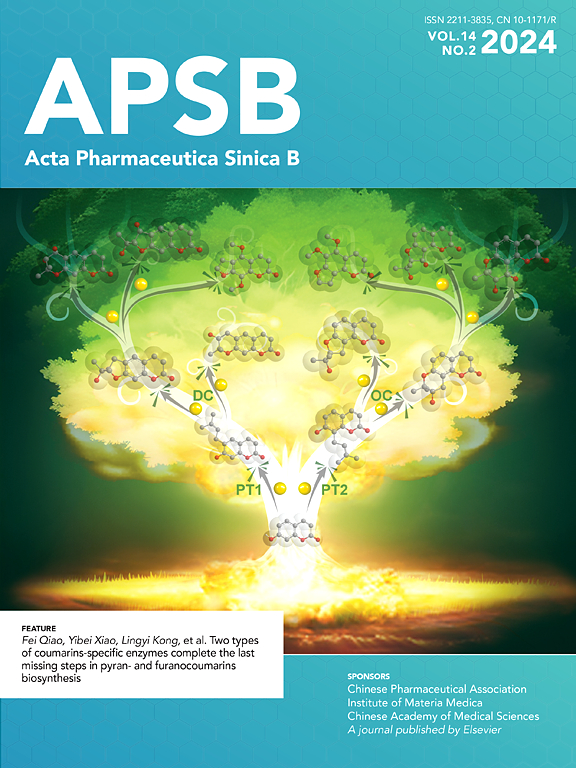肿瘤光动力治疗中活性氧(ROS)反应性药物传递系统的研究进展。
IF 14.7
1区 医学
Q1 PHARMACOLOGY & PHARMACY
引用次数: 0
摘要
活性氧(ROS)响应型给药系统(DDSs)在癌症研究中备受关注,因为它们具有针对肿瘤内高 ROS 水平进行精确时空药物释放的潜力。尽管 ROS 分布异质性和内源性供应限制带来了挑战,但本综述强调了 ROS 响应型 DDS 与光动力疗法(PDT)的战略联盟,实现了选择性给药并利用 PDT 诱导的 ROS 增强疗效。本综述深入探讨了 ROS 在癌症进展和治疗中的生物学重要性。我们详细阐明了 ROS 响应连接体(包括硫醚、硫酮、硒化物、二硒化物、碲化物和芳基硼酸/酯)的运行机制,以及与 PDT 策略相结合的 ROS 响应纳米药物的最新进展。这些见解旨在启发人们设计创新的 ROS 响应型纳米载体,以增强癌症局部放疗的效果。本文章由计算机程序翻译,如有差异,请以英文原文为准。

Recent advances in reactive oxygen species (ROS)-responsive drug delivery systems for photodynamic therapy of cancer
Reactive oxygen species (ROS)-responsive drug delivery systems (DDSs) have garnered significant attention in cancer research because of their potential for precise spatiotemporal drug release tailored to high ROS levels within tumors. Despite the challenges posed by ROS distribution heterogeneity and endogenous supply constraints, this review highlights the strategic alliance of ROS-responsive DDSs with photodynamic therapy (PDT), enabling selective drug delivery and leveraging PDT-induced ROS for enhanced therapeutic efficacy. This review delves into the biological importance of ROS in cancer progression and treatment. We elucidate in detail the operational mechanisms of ROS-responsive linkers, including thioether, thioketal, selenide, diselencide, telluride and aryl boronic acids/esters, as well as the latest developments in ROS-responsive nanomedicines that integrate with PDT strategies. These insights are intended to inspire the design of innovative ROS-responsive nanocarriers for enhanced cancer PDT.
求助全文
通过发布文献求助,成功后即可免费获取论文全文。
去求助
来源期刊

Acta Pharmaceutica Sinica. B
Pharmacology, Toxicology and Pharmaceutics-General Pharmacology, Toxicology and Pharmaceutics
CiteScore
22.40
自引率
5.50%
发文量
1051
审稿时长
19 weeks
期刊介绍:
The Journal of the Institute of Materia Medica, Chinese Academy of Medical Sciences, and the Chinese Pharmaceutical Association oversees the peer review process for Acta Pharmaceutica Sinica. B (APSB).
Published monthly in English, APSB is dedicated to disseminating significant original research articles, rapid communications, and high-quality reviews that highlight recent advances across various pharmaceutical sciences domains. These encompass pharmacology, pharmaceutics, medicinal chemistry, natural products, pharmacognosy, pharmaceutical analysis, and pharmacokinetics.
A part of the Acta Pharmaceutica Sinica series, established in 1953 and indexed in prominent databases like Chemical Abstracts, Index Medicus, SciFinder Scholar, Biological Abstracts, International Pharmaceutical Abstracts, Cambridge Scientific Abstracts, and Current Bibliography on Science and Technology, APSB is sponsored by the Institute of Materia Medica, Chinese Academy of Medical Sciences, and the Chinese Pharmaceutical Association. Its production and hosting are facilitated by Elsevier B.V. This collaborative effort ensures APSB's commitment to delivering valuable contributions to the pharmaceutical sciences community.
 求助内容:
求助内容: 应助结果提醒方式:
应助结果提醒方式:


